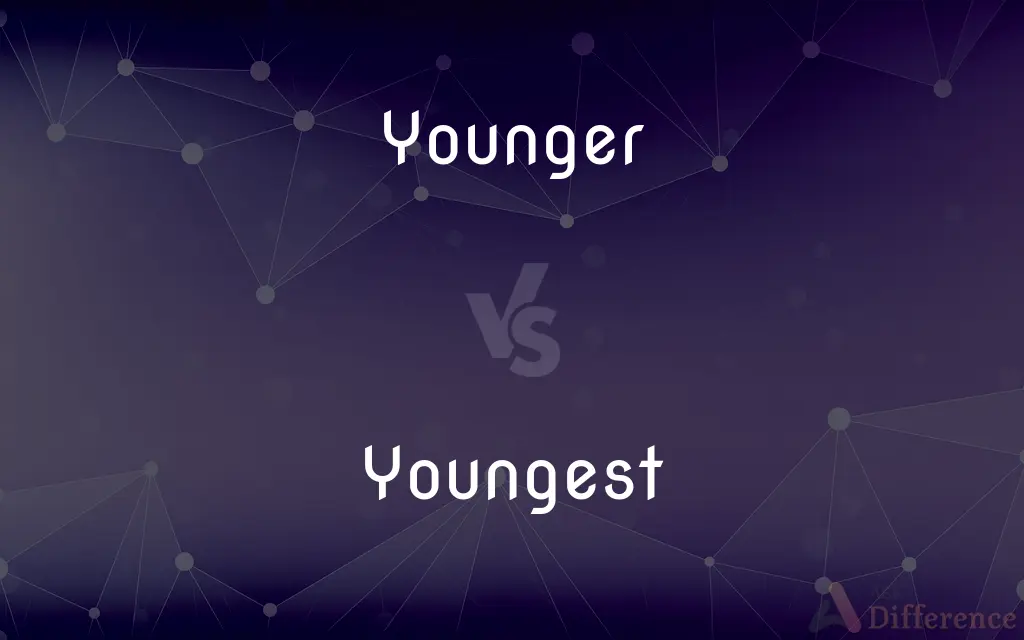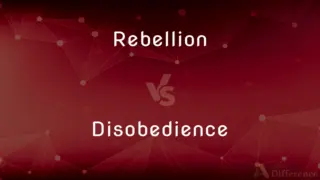Younger vs. Youngest — What's the Difference?
By Fiza Rafique & Urooj Arif — Updated on March 21, 2024
Younger indicates someone of a lower age in a comparison of two, while youngest refers to the one with the lowest age in a group of three or more.

Difference Between Younger and Youngest
Table of Contents
ADVERTISEMENT
Key Differences
Younger is used to compare two entities based on their ages, implying that one is less old than the other, but not necessarily the least old if more are involved. For example, in a family of two siblings, one might be younger than the other. Whereas youngest is specifically used when referring to the one with the least age in a group of three or more entities. This distinction is crucial in understanding familial hierarchies or sequences where age is a factor.
In grammar, younger serves as the comparative form of the adjective "young," indicating a direct comparison between two subjects. This form is used in sentences where two entities are being directly compared by their age. On the other hand, youngest is the superlative form of "young," used to describe the extreme of youth among three or more subjects. This form identifies the single entity that is younger than all others in the mentioned or implied group.
When using younger, the context often involves a direct comparison, implying a relative measure of youth between two individuals or items, such as comparing two trees to determine which was planted more recently. Whereas using youngest inherently acknowledges a broader context, such as in a competition or a family, where the focus is on identifying the one that is the most junior or has the least amount of time since birth or creation among all considered.
In cultural contexts, the term younger might be used to signify juniority or a lesser degree of experience within a binary comparison, like in a mentor-mentee relationship where one is younger in terms of either age or experience. On the other hand, youngest often carries a more definitive sense of being the last in line or holding the most junior position in a family or among a group of peers, which can come with both privileges and challenges unique to that standing.
While younger and youngest both relate to the concept of youth, their applications highlight different aspects of age-related comparisons. Younger emphasizes a relative, often binary, distinction, whereas youngest underscores an absolute standing within a group, highlighting how language nuances age dynamics in various contexts.
ADVERTISEMENT
Comparison Chart
Comparative Form
Yes (between two entities)
No
Superlative Form
No
Yes (among three or more entities)
Grammar Usage
Comparative adjective
Superlative adjective
Number of Entities Involved
Two
Three or more
Contextual Implication
Relative comparison of age
Absolute youngest in a group
Compare with Definitions
Younger
Often relates to a smaller degree of aging or development.
The younger plants are more vibrant.
Youngest
Implies having the least amount of experience among a group.
She's the youngest artist in the exhibition.
Younger
Used to describe a lower level of experience or tenure in a specific context.
He's the younger member of the team.
Youngest
Refers to the one with the lowest age in a group of three or more.
As the youngest child, she often feels spoiled.
Younger
Can imply a recent or later occurrence in a sequence.
This is the younger generation's preference.
Youngest
Indicates the most junior position within a family or organization.
Being the youngest, he always tried to prove himself.
Younger
Indicative of someone having a lower age in comparison to another.
She is the younger of the two sisters.
Youngest
Used to describe the last in a series or sequence.
The youngest episode was the most thrilling.
Younger
Reflects a comparative degree of youthfulness between two subjects.
My car is younger than yours.
Youngest
Signifies the most recent addition or the last to occur.
The youngest trend in technology is always changing.
Younger
Being in an early period of life, development, or growth.
Youngest
Being in an early period of life, development, or growth.
Younger
Newly begun or formed; not advanced
A young biotech company.
Youngest
Newly begun or formed; not advanced
A young biotech company.
Younger
Relating to, typical of, or suggestive of youth or early life
He is young for his age.
Youngest
Relating to, typical of, or suggestive of youth or early life
He is young for his age.
Younger
Lacking experience; immature
A young hand at plowing.
Youngest
Lacking experience; immature
A young hand at plowing.
Younger
Being the junior of two people having the same name.
Youngest
Being the junior of two people having the same name.
Younger
(Geology) Being of an early stage in a geologic cycle. Used of bodies of water and land formations.
Youngest
(Geology) Being of an early stage in a geologic cycle. Used of bodies of water and land formations.
Younger
Young persons considered as a group; youth
Entertainment for the young.
Youngest
Young persons considered as a group; youth
Entertainment for the young.
Younger
Offspring; brood
A lioness with her young.
Youngest
Offspring; brood
A lioness with her young.
Younger
One who is younger than another.
Youngest
Most recently begun or formed.
I may be the youngest in my family but I still resent being referred to as the baby.
Younger
Younger brother or sister;
Little brother
Youngest
(card games) Receiving dealt cards last, i.e. immediately before the next deal to the eldest.
Younger
Used of the younger of two persons of the same name especially used to distinguish a son from his father;
John Junior
John Smith, Jr.
Youngest
The youngest child in a family, or individual in a group.
Common Curiosities
What is the difference between younger and youngest?
Younger is used when comparing two people or things, while youngest is used for the one with the least age among three or more.
Can "younger" be used when talking about objects?
Yes, "younger" can describe objects in terms of newer or more recent creation or development.
Does being the youngest have cultural significance?
In many cultures, being the youngest can carry specific familial or social roles, expectations, and privileges.
How do I know when to use younger vs. youngest?
Use "younger" for comparisons between two and "youngest" when referring to the one with the least age out of three or more.
Can "younger" imply less experience?
Yes, "younger" can imply a lower level of experience or tenure, not just lesser age.
How does being younger affect sibling dynamics?
Being younger can influence sibling dynamics through roles, expectations, and comparisons in terms of achievements and milestones.
What are examples of "younger" and "youngest" in literature?
These terms are often used to describe characters in relation to each other, highlighting family dynamics or personal development.
Can animals be described as younger or youngest?
Yes, animals can be described as younger or youngest in terms of their age relative to others.
Can "younger" and "youngest" be used interchangeably?
No, their usage depends on whether the comparison is between two entities or among three or more.
Is "youngest" only applicable to people?
No, "youngest" can also apply to objects or entities within a group to indicate the most recently made or developed.
Is the use of younger and youngest limited to biological age?
No, these terms can also refer to the relative age of inanimate objects, such as cars or buildings.
Can inanimate objects like buildings be considered "youngest"?
Yes, in contexts where multiple objects are compared, the most recently constructed or developed can be called the youngest.
What are the psychological impacts of being the youngest?
The youngest in a family or group may experience unique pressures, such as living up to the achievements of older members.
How do languages other than English handle these concepts?
Many languages have distinct comparative and superlative forms, similar to English, to express these concepts.
What role do "younger" and "youngest" play in historical contexts?
These terms can help describe the relative ages of historical figures or the chronology of events and innovations.
Share Your Discovery

Previous Comparison
Rebellion vs. Disobedience
Next Comparison
Hash vs. PollenAuthor Spotlight
Written by
Fiza RafiqueFiza Rafique is a skilled content writer at AskDifference.com, where she meticulously refines and enhances written pieces. Drawing from her vast editorial expertise, Fiza ensures clarity, accuracy, and precision in every article. Passionate about language, she continually seeks to elevate the quality of content for readers worldwide.
Co-written by
Urooj ArifUrooj is a skilled content writer at Ask Difference, known for her exceptional ability to simplify complex topics into engaging and informative content. With a passion for research and a flair for clear, concise writing, she consistently delivers articles that resonate with our diverse audience.











































